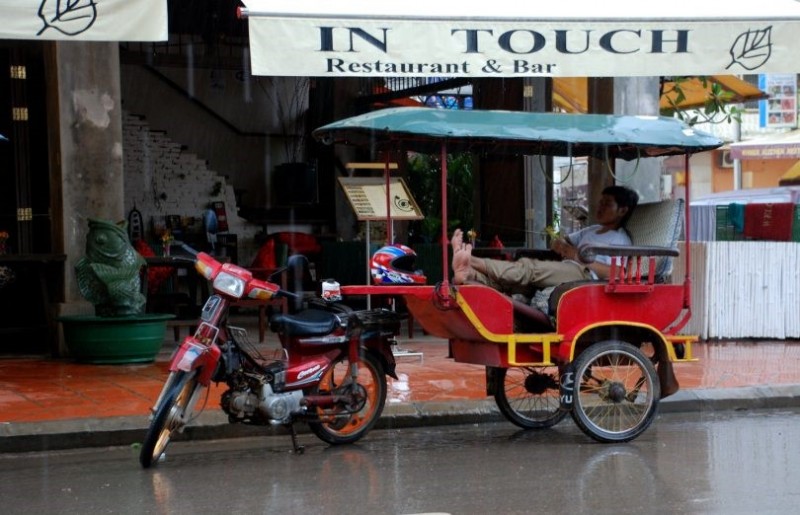
Streets crowded with tuk-tuks carrying visitors to Angkor Wat; bustling restaurants and bars; hotels and guesthouses pre-booked for the Water Festival – these scenes vanished when the COVID-19 pandemic stopped international and domestic tourists from visiting Cambodia’s sights.
Although the country’s public health situation was comparably unscathed throughout 2020 – Cambodia recorded only 331 active cases and no deaths by November 2020 – movement restrictions decreased household incomes by 30 to 60%. The situation escalated in 2021 when Cambodia went from a few cases to more than 60,000 by mid-July 2021.
Contributing over 70% of jobs and 58% of GDP in 2018, Cambodia’s micro-, small and medium-size enterprises (MSMEs) have been profoundly affected by the pandemic. The tourism industry, Cambodia’s second-largest driver of economic growth and where many MSMEs work, is especially in crisis. In 2019, tourism generated about US$4.9 billion, nearly 20% of the country’s GDP, while COVID-affected 2020 saw international tourism revenue plummet nearly 80%, to US$1.023 billion.
In 2020 and 2021, to understand the impact of COVID-19 on small businesses in the region, The Asia Foundation collaborated with local partners in carrying out multiple surveys of MSMEs in tourism, handicrafts, manufacturing and other industries across Cambodia, Lao People’s Democratic Republic, Malaysia, Myanmar, Thailand, and Timor-Leste.
In July and November 2020 and in April 2021, we also surveyed registered and unregistered businesses in Cambodia’s tourism sector. The surveys indicated that 99% had been affected by the pandemic and lockdowns, with over 50% severely affected in April 2021. As COVID-19 restrictions were extended, the situation worsened: 54% of respondents reported cash flow problems in November 2020, increasing to 83% by April 2021.
The surveys revealed a link between national COVID-19 caseloads, perceptions around business survivability, and adaptation efforts. In Cambodia, a slight majority of surveyed businesses considered COVID-19 a threat to their operations in July and November 2020, when caseloads were low, but by April 2021 more than three-quarters of businesses viewed the pandemic as a serious threat.
In July 2020, 40% of Cambodian tourism businesses reported pandemic-related layoffs, while 60% had held steady. Only 16% reported letting staff go between July and November. Instead, many had decreased employee hours or were rotating hours to keep workers. However, by April 2021, facing greater restrictions and a worsening public health crisis, 33% of Cambodian tourism businesses reported having laid off employees – twice as many as in November.
Idled tourism workers sought any short-term work opportunities to make ends meet. In Siem Reap, the gateway to Angkor Wat and other attractions, many women – who were disproportionately affected by layoffs – left the city, hoping to find jobs in the garment industry in Phnom Penh. Unfortunately, COVID-19 containment measures caused the garment factories to close.
After the first lockdown in April 2020, street vendors, taxi drivers, and tuk-tuk drivers felt less affected by the pandemic because domestic tourism and daily life continued. However, as pandemic restrictions grew and activity declined, many male tuk-tuk drivers turned to construction work – only to see worksites close in April 2021 lockdowns, leaving some with only half that month’s salary in hand.
Many Cambodian tourism MSMEs were unable to adapt their business models to digital methods. Only 8% reported doing increased business online by April 2021. Some food-related businesses, such as restaurants and street vendors in Phnom Penh, generated income through online delivery platforms. However, online is not an option for tourism businesses that cannot offer takeout food or virtual services.
Since the crisis began, Southeast Asian governments have provided a range of packages to support businesses in weathering the pandemic. However, communication about assistance and how to access it has often been inadequate.
Cambodia has provided direct support, such as cash for laid-off workers, and indirect support, such as debt restructuring. Unregistered businesses do not currently qualify for support, yet they make up a large share of employers and workers.
Although Cambodia was relatively successful in disseminating information to registered businesses compared to other countries in the region, only about 50% of MSMEs surveyed had enrolled and received needed assistance. Some said they lacked information on the programs, especially process and eligibility details, while others found the application procedures difficult to navigate.
The initial optimism of many Southeast Asian MSMEs for a 2021 economic recovery has been dampened by the latest wave of COVID-19. Despite this, Cambodia may see a quicker return to normal due to one of the highest vaccination rates in the region.
Governments must prioritise vaccine rollout, and plan for an uncertain future, in order to mitigate the economic fallout of COVID-19 containment strategies. Financial assistance for MSMEs can help negate the worst of the effects and prolong business survival. But to be effective, coverage needs to include both registered and unregistered businesses.
Beyond existing support mechanisms, governments must provide targeted and tailored assistance for women, young people, and contract and informal workers – those most adversely affected by the economic fallout. A strong and inclusive economic recovery will require more than online access and minor business adaptations – it will demand greater attention to these differential dynamics, better communication and outreach to MSMEs, and larger safety nets while scaling up vaccination.
Source: https://devpolicy.org/navigating-uncertainty-cambodian-tourism-businesses-and-pandemic-20210920/

